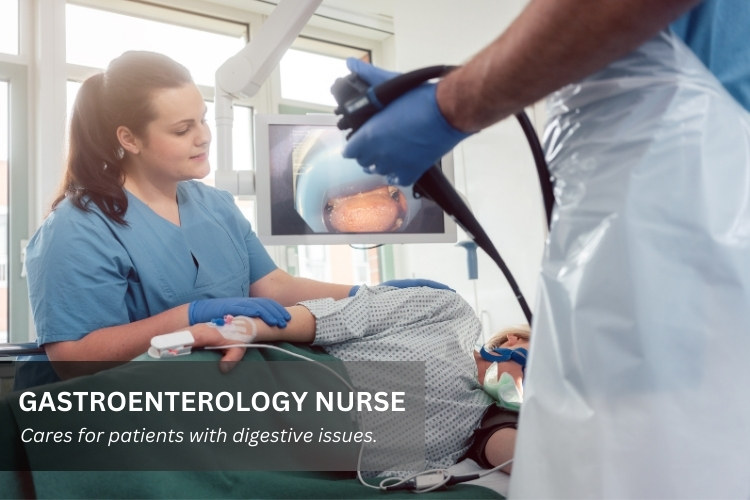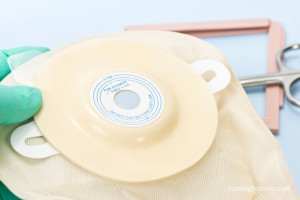Gastroenterology Nurse
Healthcare Career Guide

Overview
What is a Gastroenterology Nurse?
A Gastroenterology Nurse specializes in the care and treatment of patients with digestive system disorders. These nurses work alongside gastroenterologists to diagnose, treat, and manage conditions affecting the gastrointestinal (GI) tract, including acid reflux, Crohn's disease, ulcerative colitis, irritable bowel syndrome (IBS), and liver diseases.
Gastroenterology Nurses provide both direct patient care and support during diagnostic procedures such as colonoscopies, endoscopies, and biopsies. They educate patients on disease management, dietary recommendations, and medication adherence to help improve long-term health outcomes.
This role requires a deep understanding of gastrointestinal disorders, strong patient communication skills, and the ability to assist with specialized medical procedures.
Education
How Do I Become a Gastroenterology Nurse?
Becoming a Gastroenterology Nurse requires a nursing education, clinical experience, certification, and specialized training in gastrointestinal care. Follow these steps to enter this challenging and rewarding healthcare career:
- Earn a Nursing Degree. Complete an Associate Degree in Nursing (ADN) or Bachelor of Science in Nursing (BSN). A BSN is preferred for specialized roles in gastroenterology nursing.
- Pass the NCLEX-RN. Obtain your nursing license by passing the National Council Licensure Examination for Registered Nurses (NCLEX-RN).
- Gain Clinical Experience. Work as a Registered Nurse (RN) in medical-surgical units, endoscopy centers, or gastroenterology clinics to develop foundational GI nursing skills.
- Pursue Gastroenterology Nursing Certification. Obtain the Certified Gastroenterology Registered Nurse (CGRN) credential through the American Board of Certification for Gastroenterology Nurses (ABCGN) to demonstrate expertise in the field.
- Continue Professional Development. Stay updated with the latest advances in gastroenterology nursing by attending specialized training, conferences, and continuing education programs.
On average, it takes 4-6 years to become a Gastroenterology Nurse, including nursing school, licensure, and gaining relevant experience. Certification enhances credibility and career advancement opportunities in this field.

Average Salary
How Much Does a Gastroenterology Nurse Make?
Salaries for Gastroenterology Nurses vary based on location, experience, and certifications. On average, a Gastroenterology Nurse can expect to earn between $70,000 and $100,000 annually.
Average annual salary for a Gastroenterology Nurse:
- Entry-level: $70,000 - $80,000 per year.
- Mid-career: $80,000 - $90,000 per year.
- Experienced: $90,000 - $100,000 per year.
The U.S. Department of Labor reports that Gastroenterology Nurses earn an average hourly wage of approximately $38.00 per hour. Assuming a 40-hour workweek, this equates to an annual salary of $79,040. The lowest 10% earn less than $32.00 per hour, while the highest 10% earn more than $46.00 per hour, resulting in an annual salary range of $66,560 to $95,680 per year.
Job Duties
What Does a Gastroenterology Nurse Do?
Gastroenterology Nurses provide specialized care to patients with digestive disorders. Their responsibilities include assisting with diagnostic procedures, patient education, and disease management.
The most common job duties of a Gastroenterology Nurse:
- Assisting with Diagnostic Procedures. Prepare patients for endoscopies, colonoscopies, and biopsies while ensuring patient safety and comfort.
- Monitoring Patients. Observe patients before, during, and after procedures for any adverse reactions to sedation or treatments.
- Administering Medications. Provide IV sedation, pain relief, and prescribed treatments for digestive disorders.
- Educating Patients. Offer guidance on managing GI disorders, including dietary changes, medication adherence, and lifestyle modifications.
- Collaborating with Healthcare Teams. Work closely with gastroenterologists, dietitians, and pharmacists to coordinate patient care.
- Performing Wound and Stoma Care. Assist patients with ostomy management following surgical procedures related to GI conditions.
- Documenting Patient Care. Maintain accurate records of treatments, test results, and patient progress.
- Advanced Duties. Experienced Gastroenterology Nurses may conduct research, train new staff, or develop patient education programs.
Gastroenterology Nurses typically work in hospitals, endoscopy centers, outpatient clinics, and gastroenterology specialty practices. Their role requires strong clinical skills, attention to detail, and the ability to support patients through complex medical treatments.

Essential Skills
What Skills Does a Gastroenterology Nurse Need?
Gastroenterology Nurses need a mix of technical skills, patient education abilities, and collaboration skills to manage digestive health conditions effectively. These skills ensure they can assist in diagnostic procedures while providing supportive care to patients.
Here are some of the skills a Gastroenterology Nurse needs to succeed:
- Technical Proficiency. Operate and assist with endoscopic and colonoscopy equipment safely and effectively.
- Attention to Detail. Monitor patients for adverse reactions during and after procedures.
- Patient Education. Explain gastrointestinal conditions and treatment options in a clear, understandable way.
- Critical Thinking. Assess patient symptoms and work with healthcare teams to create appropriate treatment plans.
- Communication. Provide compassionate guidance to patients and work efficiently with gastroenterologists and other specialists.
- Time Management. Handle multiple patients and procedures efficiently in a fast-paced clinical setting.
- Compassion and Support. Help patients cope with chronic digestive conditions and post-procedure recovery.
- Infection Control Expertise. Ensure sterile techniques are followed to prevent infection during procedures.
One of the challenges of being a Gastroenterology Nurse is managing patients with chronic digestive conditions that require long-term treatment. However, the role is highly rewarding, as these nurses play a crucial role in improving patients' quality of life and managing digestive health effectively.
Last updated: March 3, 2025
References:
- Registered Nurses. Bureau of Labor Statistics, U.S. Department of Labor. Occupational Outlook Handbook. Retrieved March 3, 2025.
- Gastroenterology Nurse Salary. ZipRecruiter, Career Profile. Retrieved March 3, 2025.
- Gastroenterology Nurse. Johnson & Johnson, Nursing Careers. Retrieved March 3, 2025.
- Gastroenterology Nurse Certification. American Board of Certification for Gastroenterology Nurses. Retrieved March 3, 2025.
- Gastroenterology Nurse Education and Member Resources. Society of Gastroenterology Nurses and Associates. Retrieved March 3, 2025.
- Gastroenterology Nurse Education and News. American Gastroenterological Association (AGA). Retrieved March 3, 2025.
- Gastroenterology Nurse Education and Member Resources. American College of Gastroenterology. Retrieved March 3, 2025.
- A Day in the Life: Gastroenterology Nurse. DailyNurse, Career Profile. Retrieved March 3, 2025.
- 5 Steps for How To Become a GI Nurse. Indeed, Career Guide. Retrieved March 3, 2025.


